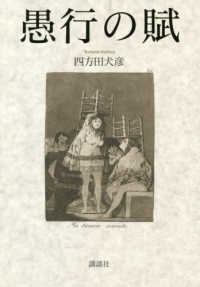Full Description
At a time when far, radical, and extreme-right politics are becoming increasingly mainstream globally - sometimes with deadly consequences - research in these fields is essential to understand the most effective ways to combat these dangerous ideologies. Yet engaging with texts and movements that do physical and verbal violence raises a number of urgent ethical issues. Until recently, this has remained understudied, as scholarship on the far right rarely delves explicitly and critically into the ethics of research.
This book seeks to remedy this significant gap in an otherwise extensive and growing literature. Originating from a workshop series in 2020, in which an international group of academics at various career stages shared the ethical challenges and best practices they had developed in their research, this edited collection draws together insights from these ongoing conversations, offering urgent critical reflections on key ethical issues.
Contents
Introduction
Part I: What's in a name
1. What the far right is(n't) - Omran Shroufi
2. Race, racism, and the far right: critical reflections for the field - Kurt Sengul
3. When racism seems to be the hardest word: critical reflections from studying the Lega (Nord) - George Newth
4. When the far right experiences violence: our ethical duty to the othered - Ryan Switzer
5. Ecofascism, far-right ecologism and neo-Malthusianism - Miranda Jeanne Marie Iossifidis
Part II: Positionality, standpoint, and intersectionality
6. 'Far right studies' and the unbearable whiteness of being - Aurelien Mondon
7. Safety and silence: oral history, far right research and the paradox of the 'vocal minority' - Imo Kaufman
8. On the incompleteness of ethnography: embracing and navigating failure as a principle in research on the far right - Balša Lubarda
9. Ethnographic empathy and research ethics as methodological whiteness - Catherine Tebaldi and Rae Jereza
10. Emotions in methodology: resisting violent ideological structures in the knowledge-production of extremisms - Elsa Bengtsson Meuller
11. Reflections on researching armed Nazis as an unarmed left-wing Jew: politics, privilege, and practical concerns - Aaron Winter
Part III: The haunting past: memory and far right studies
12. Heritage, archaeology, ancestry, and the far right - David Farrell-Banks and Lorna-Jane Richardson
13. Another way to do ethics: uses of the landscape in the far-right cultural milieu and the ethics of researching them - Andrew Fergus Wilson
14. Researching memory and heritage during a culture war - Meghan Tinsley, Ruth Ramsden-Karelse, Chloe Peacock, and Sadia Habib
15. Archiving the extreme: ethical challenges in sharing, researching, and teaching - Daniel Jones
16. Researching racism in racist times - Jean Beaman
Part IV: Care and safety
17. How do you respond when you feel under threat? A reflective exploration into my experience with the far right online - Alice Sibley
18. Community building as a response to care in studying the far right - Kayla Preston
19. Negotiating contradiction in success and safety: a consideration of environmental constraints on risk management - Antonia Vaughan
20. Spectre: covert research in digital far-right 'red zones' - Jackson Wood
21. Navigating a feminist ethics of care, ethnographic methods, and academic activism in researching men's rights and the far right: a researcher's struggles - Luc Cousineau
Part V: Complications of engaging far-right participants and formers
22. Ethics of listening: between criticism and empathy in oral history interviews and politically charged research contexts - Vanessa Tautter
23. Harms of the compassion narrative: ethical considerations regarding stories of disengagement from white supremacist movements - Joan Braune
24. Voices from the past: a psychosocial reflection on interacting with a far-right activist - Yutaka Yoshida
25. Interviewing the 'unlovable': on the challenges of conducting feminist research on far-right women - Katherine Williams
26. Examining far-right empowerment experiences using Youtube and Parler data: managing researcher safety and ethical and methodological requirements - Carina Hoerst and John Drury
Part VI: Activism and dissemination
27. Critically examining the role of the scholar in policymaking on the far right - Richard McNeil-Willson, Michael Vaughan, and Michael Zeller
28. Critical reflexivity and research on state responses to the far right - Anna A. Meier
29. An anti-racist scholar-activist ethic: working in service to racial justice - Remi Joseph-Salisbury, Laura Connelly, and Aurelien Mondon
30. The far right from the underside of history: decolonising far right studies - Isis Giraldo
31. How should journalists engage with the far right? - Gary Younge
32. Researching the far right: towards an ethics of talking 'about' - Katy Brown






